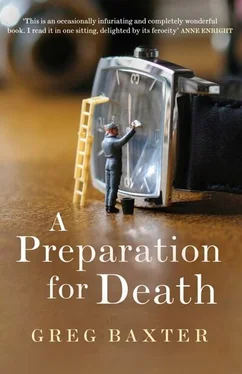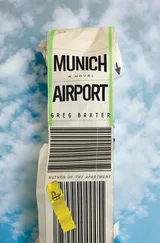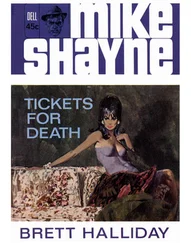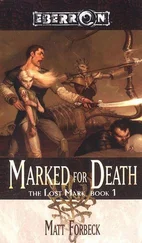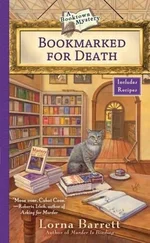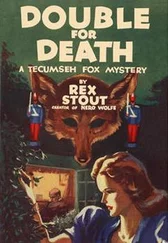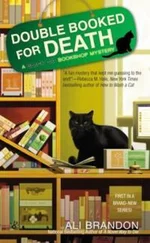At a quarter past one, Evelyn arrived. She is tall with dark brown hair, and sleepy and inconclusive blue-brown eyes. She has small breasts and broad shoulders, a tiny waist, and long arms and legs and fingers. She slipped easily into the scene, with the elegance, almost a shyness, of those women who can hide in dark restaurants, walk invisibly around the city, and sleep through afternoons in hotels.
We finished the wine and ordered another bottle. It was as sour as the previous, but by then it didn’t matter. When my food came — cod and chips — I didn’t want to eat. My gut was a derelict mill. Some days it was hot and murky; on others, a dry wind blew through it. Nothing stayed put for long: I didn’t seem to process anything. I just ate and ran to the toilet. Over the previous six or eight weeks, I’d dropped ten pounds. My face had turned a shade or two greyer — I looked like a jar of old rainwater — and I had no energy. It wasn’t just the late nights during the week, though that was surely most of it. That January I’d been struck by glandular fever, and ignored it to save sick days for hangovers. Three months later the glands in my armpits were still like soft oranges.
Evelyn got a plate of pasta and finished half of it with a scowl. She was living a secret life that involved two men, and I found her to be the most intriguing person I had ever met. She seemed a little shocked that she was twenty-nine.
She talked about New York: museums she visited, restaurants and hotels. Her favourite spot was the Strand Bookstore; she spent hours in the section for rare and first edition books. She had one with her — a gift for me — and we sniffed it: that’s exactly what the whole place smelled like, she said. Her mother, who had never left Ireland before, was with her in New York. They took the subway everywhere, which terrified the mother: the lurking and shadowy implication of murder, the violence of crowds and ethnicity.
By the time lunch ended, I was drunk again. We stood outside the pub for a moment and, to avoid being jostled by pedestrians, we stood very close together. Evelyn was drunk too. She tried to convince me to skip work and come with her to the Irish Film Institute, but taking the afternoon off would have meant quitting my job, and I wasn’t quite ready to do that. We casually discussed the possibility that we might meet later that night.
I watched her disappear around the corner. Most women just walk away, but a few, like Evelyn, can vanish; and when they vanish, you watch the absence of them. I decided I needed quite a few cigarettes and a coffee and some chewing gum. At once I regretted my decision not to go to the cinema. I felt that if we’d stayed together for a few more hours, we would’ve got on a plane to Paris. In the little shop two doors down, I dropped change and must have looked like a clown, trying to gather it. I was surrounded by the naked calves of office girls and solicitors in high heels. It does not take too many naked calves to make one feel surrounded by them. I wanted to lick them. I often feel one drink away from whatever makes a dog hump women’s legs.
The walk from Dame Street and Temple Bar to my office on Upper Ormond Quay takes you from a city — at least in daytime — that is clean and full of quirky cafés and small art galleries and oinking tourists to one that is grimy and dilapidated and full of lawyers and criminals and addicts orbiting the Four Courts. The Liffey is always murky and snotty, and if you are not feeling well it makes you want to vomit. And if the river does not make you want to vomit, then look along the quays, upon the sad and unambitious architecture of the city, and you will want to vomit. I got myself a coffee at a little soup place owned by two nice black-haired women, whom I suspect/hope are lovers. It is nice to have romance around. I spat out my gum and drank about half the coffee — I needed to be slightly alert — and smoked another cigarette, and by then my gut felt like an agitated beehive so I walked to the little crumbling potholed alley that lies behind my office building, where heroin addicts crawl harmlessly into shadowy garageways and shoot up, and I puked for a little while.
The puking made me weak, and the walk up one flight of stairs to my desk left me breathless. I was very late. One of my bosses came out to glare at me — as though I would become so frightened by him that I’d never take a lunch again. I waved and burped. I sat at my desk and moved my mouse to wake up the screen. I entered my password. I watched as my email refreshed. Press releases, doctors complaining, spam, breaking news reports, on and on and on. Every hour of every day.
I put on my headphones and hoped a text would come from Evelyn. One did. She said she wished we could’ve spent the afternoon together. I imagined her sitting somewhere in the back of a large empty cinema watching a subtitled Korean masterpiece with fighting and star-crossed lovers, and I went into the bathroom to masturbate. I had never done that before, and I went with trepidation. The problem, of course, is that once you find a comfortable spot, there’s no end to it. Pretty soon you go there just because you’re bored. Pretty soon it’s like a cigarette break. But I could not shake the image: Evelyn, on my lap in the back row of the cinema, holding onto the seat in front of her, watching the film, fucking me. I couldn’t sit down. The toilet seat was too disgusting, and the thought that anyone in my office had settled down there for a long and stinky shit was ghastly. The whole thing was ghastly (there was also a brown toilet brush on the floor), but I could not stop. Now I saw myself between her legs, masticating with bovine stupidity and single-mindedness. And she could not stop coming. I stood straight up in the tiny little room and yanked at myself for five minutes, until I was too exhausted to continue.
I had a cigarette to catch my breath afterward, out in our grey little parking square. It was the only way I could breathe. Nobody ever cleans the space — though every week someone empties the big dumpster — and ten years or more of cigarettes and muck have accumulated in the corners. Every year the office forms a committee to clean it up — and every year the committee gets a different name — but nobody joins it.
I left the office at five and walked toward a pub for a few drinks on my own; the friends I was to meet weren’t coming in for a while. The cars on the quays had thirty minutes of gridlock to face before they reached O’Connell Bridge, which was less than half a mile away. Girls in suits and runners pounded up and down the footpaths. Tourists were lost — nobody came that way on purpose. The days were getting longer in a hurry. Summer was coming — there was no way back.
I sat at the bar and ordered a beer. I took out a book — the one from Evelyn — and smelled it again: the scent of long-dead and forgotten authors. I imagined her on the floor, between high shelves, the tops of which you have to reach with ladders, surrounded by too many books to carry back to Ireland. She would buy them all. They would reappear in her bedroom. They would watch her slip into and out of her dressing gown. They would sleep beside her — she would read them until her eyes closed. At work, as she absent-mindedly filled out spreadsheets and calculated year-end whatevers, she would miss them, and daydream, and want to write her own.
Whenever I cover stories outside the office, I like to procrastinate in the city. Other journalists hail taxis while jotting down notes on their notes, or jog back to their computers while the memories are still fresh, but I take circuitous walks, window shop, browse bookstores. In April — it might have been May — I sat through a four-hour conference on healthcare in the Conrad Hotel. I had been out very late the previous night, so I hid in the back rows unshaven and smelling of sweet cheese and nicotine and sent texts to all the people I’d been with to blame them for my hangover. Now and again I’d write down something that was said by a man addressing the crowded room. He would say something like: The more money I make, the better patients feel. And everyone would clap like seals at a zoo.
Читать дальше
